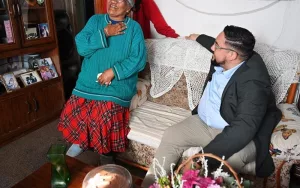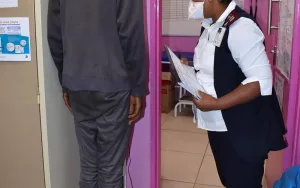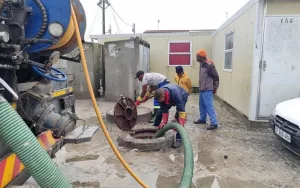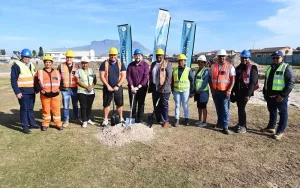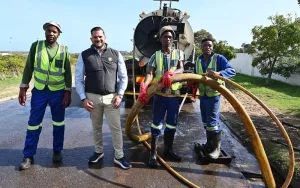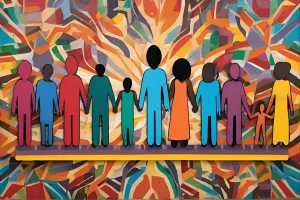When a fishing vessel sank off the South African coast, neighbouring fishing boats and rescue organizations sprang into action, leading to the recovery of nine out of twenty local fishermen. Despite the intensive air and sea search, the fate of the missing eleven fishermen remains uncertain. This event highlights the unity and resilience of the maritime community, always willing to put their own safety on the line to save others.
Jaco Pieterse, Chief Inspector of the Cape of Good Hope SPCA, celebrates his birthday on the 18th of May by starting an annual fundraising drive to raise money for the rehabilitation of animals in need. This year, the campaign focused on Toby, a dog rescued from severe neglect. Through the BackABuddy campaign, Pieterse aimed to raise R45,000, but the campaign exceeded expectations, raising R90,500 to support animals in need. This success highlights the importance of animal welfare and the fight against animal abuse.
South Africa is focused on improving public housing conditions and recognizing its elderly tenants for their contributions. The city is committed to investing in safety measures and higher rental payments, with the revenue gained essential for better living environments. Residents are urged to fulfill their role by paying rent, which supports a wellmaintained public housing system and contributes to a safer and more dignified community.
Hypertension, or high blood pressure, is a dangerous health risk that can lead to serious complications like stroke and heart attack. The city’s health department has increased screenings and promoted prevention measures like medication, physical activity, and healthy eating to combat this “silent killer.” They have found that more young people are being diagnosed with hypertension, and urge everyone to prioritize their health and get screened regularly. By adopting a preventive healthcare approach and routine screenings, the city’s health department is fighting against this unseen threat.
President Cyril Ramaphosa has pledged to provide necessary compensation to workers injured in a building collapse in George, Western Cape. The government will also ensure those responsible are brought to account. The President visited the collapse site and engaged with various parties involved in the aftermath, including Western Cape Premier Alan Winde, to address the crisis. The tragedy has highlighted the importance of building safety and labour rights, but also the resilience and unity of the community in the face of adversity.
South Africa’s participatory democracy has entered a new chapter with the establishment of a new Parliamentary Constituency Office (PCO) in Botshabelo, Free State, under the stewardship of Mr. Lechesa Tsenoli. The refurbished PCOs provide a platform for Members of Parliament to communicate directly with the public, facilitating a deeper understanding of their concerns and aspirations. The goal is to promote public access and meaningful engagement in parliamentary proceedings, nurturing a more inclusive society. The Botshabelo PCO symbolizes a new era of lively community partnership and a vision for an inclusive democracy.
A Comprehensive Review of Legislative Changes Adopted by South Africa’s National Council of Provinces
South Africa’s National Council of Provinces approved six important legislative acts on May 16, 2024, including the Electricity Regulation Amendment Bill to overhaul the electrical industry and the General Intelligence Laws Amendment Bill to enhance national security measures. Other approved legislation includes the National Water Resources Infrastructure Agency Bill, the Marine Pollution (Prevention of Pollution from Ships) Amendment Bill, the Transport Appeal Tribunal Amendment Bill, and the Plant Health (Phytosanitary) Bill. These legislative changes aim to enhance the agricultural sector, protect the marine environment, restructure the transportation system, and improve the water supply.
Cape Town officials and South African Police Service (SAPS) have launched new law enforcement facilities in disadvantaged communities to improve public safety. The enlargement of police services is a result of a partnership between the City of Cape Town and SAPS, with the shared objective of bolstering law enforcement apparatus and extending their reach to the most vulnerable neighborhoods. This partnership sets an example for other cities to follow in their pursuit of community safety.
The maintenance of vast sewage and river systems is a strategic priority, particularly as a sewage overflow or river flood is the last thing a city needs during the colder months. The city’s Water and Sanitation Directorate is preparing for winter’s increased stormwater volume by cleaning sewer pipelines, clearing litter traps in river systems, and monitoring stormwatertosewer connections. Residents can help by adhering to protocols like flushing only human waste and reporting blockages and overflows. By collaborating with the city’s efforts, we can ensure a safer and cleaner winter season.
Cape Town is ushering in a new era of affordable housing with the Bonteheuwel Infill housing project, which will provide 273 modern housing units by the end of 2025. The project is a symbol of the city’s dedication to providing dignity and human settlements for its citizens, with a fair and transparent allocation process. This architectural marvel embodies the Breaking New Ground statesubsidised houses and is a beacon of hope for future housing schemes, driving Cape Town closer to its objective of becoming a city for all.
Preparing for Winter: The Persistent Urban Mobility Heroes and the Intricacies of Catch Pit Upkeep
The Urban Mobility Directorate is responsible for maintaining the cleanliness of our streets and ensuring the smooth functioning of our drainage systems. As winter approaches, they focus on enhancing efforts to upkeep and clean the city’s catch pit infrastructure to prevent potential flooding and ensure our safety on the roads. The team employs a range of cleaning techniques and manual labor, and citizens should be mindful of their actions to avoid causing problems in the drainage system. Despite often going unnoticed, the directorate plays a crucial role in our daytoday lives in protecting our city’s infrastructure.
South Africa has made a revolutionary stride in its healthcare policy with the enactment of the National Health Insurance Act. This law guarantees every South African access to a range of healthcare services without financial difficulties, promoting equity, sustainability, fairness, and social solidarity. The journey towards achieving this law has been long, with numerous consultations and feedback, but it marks the beginning of a new era and a promise of a healthier, brighter future for all South Africans.
South African art is on the rise, with artists like Irma Stern and Alexis Preller gaining global recognition. The Evening Sale at Strauss & Co in Johannesburg on May 28th, 2024 features many pieces highlighting the diversity and talent of South African artists. This auction offers a comprehensive overview of South African art, tracing its roots through to the present day, and signifies a crucial stride in the international restoration of South Africa’s historical artists.
South Africa has introduced the National Health Insurance (NHI) Bill, a revolutionary healthcare initiative aimed at eliminating inequalities in healthcare access based on social and economic status. The NHI proposes a holistic strategy that consolidates different financial resources to guarantee quality healthcare accessibility to all South Africans. The implementation of the NHI will be gradual, with critical milestones earmarked for each phase, and it serves as a crucial instrument to combat poverty and represents a step towards abolishing a biased healthcare system.
A New Dawn: Woodlands, MPlain’s Public Housing Revolution Invites R1,2 Billion Investment
The city of Woodlands in Mitchells Plain is undergoing a public housing revolution, with an investment of R1.2 billion over the next three years aimed at revitalizing public housing upkeep and refurbishments. Councillor Carl Pophaim has formulated a strategy to combat rampant vandalism in public housing units, encouraging tenants to report any acts of vandalism and allocating more teams to emergency tasks. This investment is about more than just replacing staircases; it signifies progress towards a future of safety, dignity, and community unity.
Immediate Measures to Combat Infrastructure Vandalism in Schaapkraal: An Emergency Response
Schaapkraal, a locality in Cape Town, is facing a crisis due to rampant vandalism of infrastructure, especially electricity supply. The City of Cape Town has adopted a nononsense attitude towards the desecration of electricity infrastructure and is working with stakeholders to find longterm solutions for durable infrastructure. Safety is a top priority, and residents are urged to report suspicious activities to protect their community’s vital assets. The City’s electricity teams, in partnership with relevant stakeholders, are proactively working to combat the alarming levels of vandalism and ensure the durability of Schaapkraal’s infrastructure.



